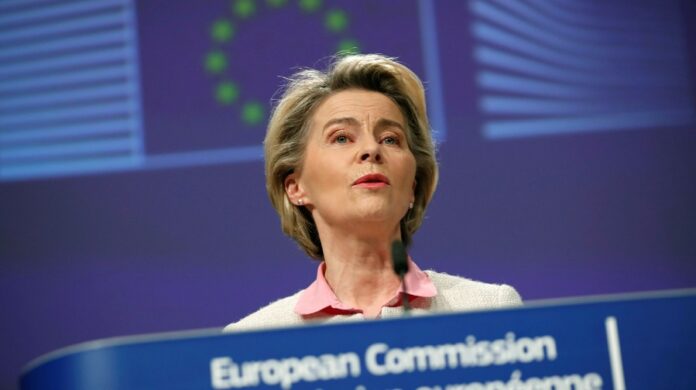Europe needs to be “bolder” on China, which has become “more repressive at home and more assertive abroad,” the president of the European Commission said on Thursday, according to Politico.
In a speech ahead of her visit to China next week, Ursula von der Leyen warned Beijing not to side with Moscow in bringing compromised peace to Ukraine, saying: “How China continues to interact with Putin’s war will be a determining factor for EU-China relations going forward.”
She implied, for the first time, that the EU could terminate pursuing a landmark trade deal with China, which was clinched in 2020 but subsequently stalled by the European Parliament after some of its members were sanctioned by Beijing.
“We have to recognize that the world and China have changed in the last three years — and we need to reassess CAI in light of our wider China strategy,” she said at an event co-hosted by the European Policy Center and Merics, referring to the China trade deal, known as Comprehensive Agreement on Investment.
While von der Leyen has commented critically on China in the past, this is the first time the EU chief has given a full speech on the bloc’s relations with Beijing. Pointing to the situation in Taiwan, human rights violations in Xinjiang, and economic retaliations against Lithuania, she said: “These escalatory actions point to a China that is becoming more repressive at home and more assertive abroad.”
“We are concerned by what is behind this return to the global stage,” said von der Leyen, who will be traveling to China next week with French President Emmanuel Macron. “We have seen a very deliberate hardening of China’s overall strategic posture for some time. And it has now been matched by a ratcheting up of increasingly assertive actions.”
She was especially critical of the ties between Xi Jinping and Vladimir Putin, the Chinese and Russian leaders, who met last week in Moscow.
“Most telling,” von der Leyen said, “were President Xi’s parting words to Putin on the steps outside the Kremlin when he said: ‘Right now there are changes, the likes of which we haven’t seen for 100 years. And we are the ones driving these changes together.'”
She also called on EU countries to make “bolder and faster use” of new economic tools against China, including screening of foreign subsidies and a new policy against economic coercion. The Council of the EU, representing the EU member states, has been wary of over-empowering the Commission to take decisions on punishing coercive countries.
Amid what she described as an “unbalanced” economic relationship, von der Leyen said the EU will introduce a new Economic Security Strategy later this year.
The EU, she added, needs to “define its future relationship with China” in sensitive high-tech areas such as microelectronics, quantum computing, robotics, artificial intelligence and biotech.
Despite all the rallying calls for defensive action, von der Leyen ended the speech with a note of cautious optimism. “China is a fascinating and complex mix of history, progress and challenges. And it will define this century,” she said.
“But our story about how we relate to China is not yet fully written — and it need not be a defensive one.”


